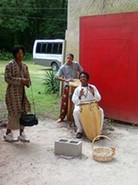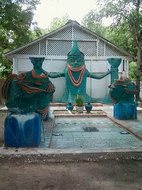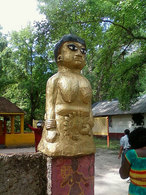Charlston City Paper
They Don't Practice Santeria
Oyotunji African Village, Sheldon
It was the best of times, it was the worst of times. It was 1973. The O'Jays were rocking some "Love Train," the last soldier had just left Vietnam, and Carlton Jackson, Jr. was feeling disillusioned. He was working at IBM and studying anthropology at the University of California Berkeley when sometime around Easter he picked up a copy of Jet magazine. It changed his life. On the cover was a picture of a new community called Oyotunji African Village in Sheldon, S.C.
"I bought a one-way ticket and took no luggage," says Jackson. He's been there ever since.
Oyotunji is located just off Highway 17 near Beaufort. You've probably driven past the small community a dozen times and never realized it, but take a sharp right turn on your way down to Savannah and you'll find yourself in a different world where residents have traded modern convenience for a chance to live the Yoruba faith and celebrate West African culture.
"Many of the African descendants that awakened in the 1960s and '70s were hungry for ancestral traditions, values, and culture," writes Iya Oyatolu Olejoye in Survival and Resurgence of the Yoruba in America. Walter King, a New York City-based dancer, was one of them. In 1955, King began his own personal exploration into African traditions with a trip to Haiti. In '59, he headed off to Cuba and became initiated into the Orisha priesthood, part of the Yoruba religion. Wanting to share his faith and ideas with African Americans, he returned home with a plan.
"Oyotunji was started by King in 1970 on a plot of land on the other side of 17," says village elder and root doctor Baba Akinwon. Dressed in a loose, maroon dashiki, Akinwon greets visitors at the village gate and is the go-to spokesman for the property. As the story goes, King, who came to be called His Royal Highness Oba Efuntola Oseijeman Adelabu Adefunmi, felt there was a "cultural amnesia affecting African Americans." Oyotunji was his antidote.
Akinwon, who grew up in Beaufort, says he first saw the village in 1973, but he didn't actually move to the property until 1991. "I wasn't interested in religion at the time," he says, but as soon as he met a pretty young lady at a club in Beaufort who lived at Oyotunji, things started to change. "The activities here opened my mind. And that lady I met is now my wife of 23 years," he says.
The transition from modern-day man to village priest was no easy task. Akinwon says, "It was hard for me to come here because I loved to party and dress in nice clothes." Once an individual becomes a member of Oyotunji, they're asked to give up their material belongings, and their faith becomes the focus of their lives.
In keeping with that mission, the property is a delicate matrix of shrines. Oshun the god of energy and love, Ogun, god of metal and war, and Oya Mamaloja, goddess of changes like birth and death, all have their own individual places of worship. Respecting one's ancestors is key as well, and on the day the City Paper visited, the village was celebrating an annual festival to honor the spirits of those past. One villager said this year she was honoring her father by serving her neighbors shots of Johnny Walker Red, her dad's favorite. If that's not a reason to visit, what is?
Plenty.
"People come here if they're having a problem with the law, or they may come ask for assistance from trouble," says Akinwon, who makes a good part of his living as a root doctor. During his tenure, Akinwon has seen it all, from folks looking for love and revenge, and even a local politician in Beaufort who asked the gods for an Election Day victory. There has also been a parade of celebrity visitors who come to "help their careers in Hollywood," Akinwon says nonchalantly. We couldn't get him to tell us which stars that included, but we've got five bucks on LaToya Jackson.
Oyotunji African Village, Sheldon
It was the best of times, it was the worst of times. It was 1973. The O'Jays were rocking some "Love Train," the last soldier had just left Vietnam, and Carlton Jackson, Jr. was feeling disillusioned. He was working at IBM and studying anthropology at the University of California Berkeley when sometime around Easter he picked up a copy of Jet magazine. It changed his life. On the cover was a picture of a new community called Oyotunji African Village in Sheldon, S.C.
"I bought a one-way ticket and took no luggage," says Jackson. He's been there ever since.
Oyotunji is located just off Highway 17 near Beaufort. You've probably driven past the small community a dozen times and never realized it, but take a sharp right turn on your way down to Savannah and you'll find yourself in a different world where residents have traded modern convenience for a chance to live the Yoruba faith and celebrate West African culture.
"Many of the African descendants that awakened in the 1960s and '70s were hungry for ancestral traditions, values, and culture," writes Iya Oyatolu Olejoye in Survival and Resurgence of the Yoruba in America. Walter King, a New York City-based dancer, was one of them. In 1955, King began his own personal exploration into African traditions with a trip to Haiti. In '59, he headed off to Cuba and became initiated into the Orisha priesthood, part of the Yoruba religion. Wanting to share his faith and ideas with African Americans, he returned home with a plan.
"Oyotunji was started by King in 1970 on a plot of land on the other side of 17," says village elder and root doctor Baba Akinwon. Dressed in a loose, maroon dashiki, Akinwon greets visitors at the village gate and is the go-to spokesman for the property. As the story goes, King, who came to be called His Royal Highness Oba Efuntola Oseijeman Adelabu Adefunmi, felt there was a "cultural amnesia affecting African Americans." Oyotunji was his antidote.
Akinwon, who grew up in Beaufort, says he first saw the village in 1973, but he didn't actually move to the property until 1991. "I wasn't interested in religion at the time," he says, but as soon as he met a pretty young lady at a club in Beaufort who lived at Oyotunji, things started to change. "The activities here opened my mind. And that lady I met is now my wife of 23 years," he says.
The transition from modern-day man to village priest was no easy task. Akinwon says, "It was hard for me to come here because I loved to party and dress in nice clothes." Once an individual becomes a member of Oyotunji, they're asked to give up their material belongings, and their faith becomes the focus of their lives.
In keeping with that mission, the property is a delicate matrix of shrines. Oshun the god of energy and love, Ogun, god of metal and war, and Oya Mamaloja, goddess of changes like birth and death, all have their own individual places of worship. Respecting one's ancestors is key as well, and on the day the City Paper visited, the village was celebrating an annual festival to honor the spirits of those past. One villager said this year she was honoring her father by serving her neighbors shots of Johnny Walker Red, her dad's favorite. If that's not a reason to visit, what is?
Plenty.
"People come here if they're having a problem with the law, or they may come ask for assistance from trouble," says Akinwon, who makes a good part of his living as a root doctor. During his tenure, Akinwon has seen it all, from folks looking for love and revenge, and even a local politician in Beaufort who asked the gods for an Election Day victory. There has also been a parade of celebrity visitors who come to "help their careers in Hollywood," Akinwon says nonchalantly. We couldn't get him to tell us which stars that included, but we've got five bucks on LaToya Jackson.
Most Frequently Visited PagesRequest an International Invitation Letter
|
Contribute to OAV |
Website: http://www.oyotunji.org Email: [email protected] Hours of Operation: 11 a.m.- Dusk Location: 56 Bryant Lane Seabrook, SC 29940 |
OYOTUNJI.ORG




